What is our Image of the Child?
We have worked together to define what we believe about children, what is important for children, and what children need.
Image of Child:
We see children with an inherent connection to nature,
Part of a familiy and culture,
Competent to use their voice to iniate learning.
|
Acknowledgement of Australia's Traditional Owners:
We acknowledge the Traditional Owners of the land on which the Service is built, and their continuing connection to the land.
We pay our respects to the Yinngarrda people, and to all Australia's Indigenous peoples whose cultures and customs have nurtured this land their children and families for generations.
We pay our respects to Elders past and present.
One of our daily rituals is to repeat the following acknowledgement with the children.
Here is the land here is the sky,
here are my friends and here am I.
We thank the Yinngarrda people for the land on which we learn and play.
Hands up, hands down,
we are on Yinngarrda land.
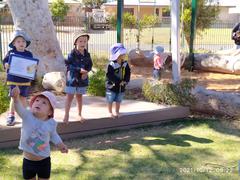
|
Mission Statement
To provide a partnership of care for families and children, in an environment built on trust and open communication, that encourages the holistic development of families, children, and staff.
Early Years Learning Framework
|
Fundamental to the Framework is a view of children’s lives as characterised by belonging, being and becoming. From before birth children are connected to family, community, culture and place. Their earliest development and learning takes place through these relationships, particularly within families, who are children’s first and most influential educators. As children participate in everyday life, they develop interests and construct their own identities and understandings of the world.
|
|
Belonging
|
Experiencing belonging – each child will be assigned a home room to allow them to form secure attachments within a smaller group and a room for their possessions to develop their sense of Belonging.
Knowing where and with whom you belong – is integral to human existence. Children belong first to a family, a cultural group, a neighbourhood and a wider community. Belonging acknowledges children’s interdependence with others and the basis of relationships in defining identities. In early childhood, and throughout life, relationships are crucial to a sense of belonging. Belonging is central to being and becoming in that it shapes who children are and who they can become.
|
|
Being
|
Childhood is a time to be, to seek and make meaning of the world. Being recognises the significance of the here and now in children’s lives. It is about the present and them knowing themselves, building and maintaining relationships with others, engaging with life’s joys and complexities, and meeting challenges in everyday life. The early childhood years are not solely preparation for the future but also about the present.
|
|
Becoming
|
Children’s identities, knowledge, understandings, capacities, skills and relationships change during childhood. They are shaped by many different events and circumstances. Becoming reflects this process of rapid and significant change that occurs in the early years as young children learn and grow. It emphasises learning to participate fully and actively in society.
|
Learning Outcomes
|
Learning Outcome 1:
Children have a strong sense of identity
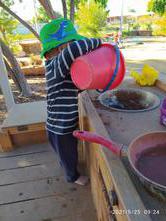 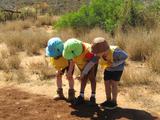
|
Children feel safe, secure, and supported
Children develop their emerging autonomy, inter-dependence, resilience and sense of agency
Children develop knowledgeable and confident self-identities
Children learn to interact in relation to others with care, empathy and respect
|
|
Learning Outcome 2:
Children are connected with and contribute to their world
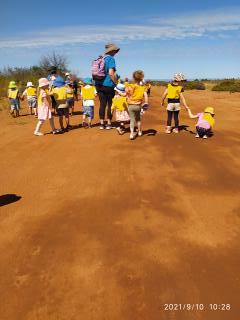
|
Children develop a sense of belonging to groups and communities and an understanding of the reciprocal rights and responsibilities necessary for active community participation
Children respond to diversity with respect
Children become aware of fairness
Children become socially responsible and show respect for the environment
|
|
Learning Outcome 3:
Children have a strong sense of wellbeing
 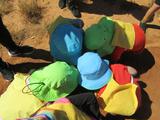
|
Children become strong in their social and emotional wellbeing
Children take increasing responsibility for their own health and physical wellbeing
|
|
Learning Outcome 4:
Children are confident and involved learners
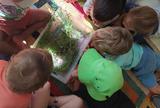
|
Children develop dispositions for learning such as curiosity, cooperation, confidence, creativity, commitment, enthusiasm, persistence, imagination and reflexivity
Children develop a range of skills and processes such as problem solving, enquiry, experimentation hypothesising, researching and investigating
Children transfer and adapt what they have learned from one context to another Children resource their own learning through connecting with people, place, technologies and natural and processed materials
|
|
Learning Outcome 5:
Children are effective communicators
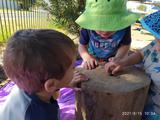
|
Children interact verbally and non-verbally with others for a range of purposes
Children engage with a range of texts and gain meaning from these texts
Children express ideas and make meaning using a range of media
Children begin to understand how symbols and pattern systems work
Children use information and communication technologies to access information, investigate ideas and represent their thinking
|
|
|
Welcome to Granny Glasgow Education and Care
Hello and Welcome!
Granny Glasgow Education and Care offers an exciting and challenging environment where children are provided with many opportunities to learn while playing.Our care environment offers a diversity of learning experiences for young children. We know how important it is for parents to know that their children are safe, happy and in a positive play and learning environment.
Granny Glasgows offers all of this and more, making it easy for parents to make the decision to return to work, and leave their children in the hands of our professional and very experienced Educators.
We offer Full Time, Part Time and occasional Long Day Care to children aged from six weeks to five years old (until the end of the year the child turns five).
We are located at 15 Butcher Street Carnarvon, in Western Australia.
" Grannies" has been established on this site since October 1986, and underwent major renovations and extension during 2014/2015.
The large outdoor play area underwent a complete make over in 2020 with the help of Lotteries West. The extensive nature Playground was created with many natural elements to provide children with direct contact with natural elements such as sand, water rocks, sticks, leaves, flowers and bugs!.
The Service is Licensed to provide care places for 58 children per day.
The Centre is open Monday to Friday from 7.30am to 5.30pm.
The Service has three home rooms where children place their belongings, children eat in a communal dining area (the cafe), and children play together across the Service between the Art Studio, the Exploreres room, inside and outside.
We invite you to browse through our website, give us a call any time if you require further information or clarification on our services, or pop in to visit us if you are in Carnarvon and would like a tour of our much loved Service.
Fawn Law-Davis.
Opening Doors - Removing Barriers
One of the first things you will notice about Grannies is that we pride ourselves on being different to the run of the mill ChildCare Services. What informed our decision making prior to the changes?
In 2016, following a week of intensive professional learning about the principles of the 'Reggio Emilia' approach to care, and the Rights of The Child, our team embarked on a journey to change our practice. Most significantly by removing all internal doors, to enable our children to move freely around the centre and not be defined by age and room allocations. We then installed a new door to bring the outside in, and the inside out, again, allowing our children to move freely in/outside at their leisure. Later the same year we removed the fences dividng the outdoor play spaces, to allow children a wider option of play spaces and outlooks.
There have been many changes in practice and in the physical environment. The children are no longer separated by age, but are grouped as babies or confidently mobile. All confidently mobile children have access to most play areas, inside and out throughout the majority of the day.
The rooms are defined by purpose: Art Studio, Café, Explorers and Babies.
Each child has a home room where belongings are stored and babies have their own area which the younger children can return to at leisure. The management, staff, children and parents have embraced the positive changes brought about by the installation of the door which has opened the way to removing barriers and creating a new landscape for play.
Opening doors and removing barriers, opening minds and changing practice are not easy tasks to undertake and often creates more questions than answers.
We aim to:
- look beyond what traditional childcare practice has looked like and see the full potential in every child, every day, for every teacher and every time (Harcourt, 2016).
- truly see the children and their competence.
- give the child a stronger voice.
- change our routines and transitions to rituals and traditions.
- change schedules and changeovers to ceremonies and customs.
I believe we can do this exceptionally well and my team is working hard to make it happen!
|